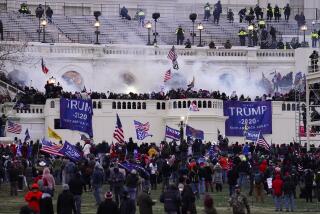Supreme Court OKs strip searches for even minor offenses
Washington — The Supreme Court refused Monday to limit strip searches of new jail inmates, even those arrested for minor traffic offenses.
Dividing 5-4 along ideological lines, the high court said jail guards needed the full authority to closely search everyone who is entering a jail in order to maintain safety and security.
It would be “unworkable,” said Justice Anthony M. Kennedy, to make an exception for persons who are arrested for minor offenses. County jails often must process hundreds of new inmates a day, he said.
“Experience shows that people arrested for minor offense have tried to smuggle prohibited items into jail,” Kennedy said. And officials cannot take such a risk, he added.
The decision is a defeat for civil liberties groups and a New Jersey man who was strip-searched twice after he was stopped on a highway and taken to jail over an unpaid fine.
Albert Florence was held for six days and finally released when he showed the fine had already been paid before he was arrested. He then sued county jail officials for violating his privacy and subjecting him to a humiliating strip search.
A judge ruled in his favor, but he lost before the U.S. Court of Appeals. In delivering his opinion, Kennedy said violent criminals sometimes are arrested for minor traffic offenses.
He cited the example of Timothy McVeigh,the man who bombed the federal building in Oklahoma City in 1995. He was stopped and taken to jail for a traffic violation. Chief Justice John G. Roberts Jr.and Justices Antonin Scalia, Clarence Thomas and Samuel A. Alito Jr. joined with Kennedy.
In dissent, Justice Stephen G. Breyer said it was unreasonable to subject possibly innocent persons to humiliating searches, particularly when they are not suspected of a serious crime.
“In my view, such a search of an individual arrested for a minor offense that does not involve drugs or violence is an unreasonable search forbidden by the 4th Amendment,” he wrote. Justices Ruth Bader Ginsburg, Sonia Sotomayor and Elena Kagan agreed.
The case was Florence vs. Board of Chosen Freeholders of Burlington County.
ALSO:
Trayvon Martin case prompts protest T-shirt subculture
Credit card processing company explains security breach
Search for runner Micah True is over; body found in wilderness
More to Read
Sign up for Essential California
The most important California stories and recommendations in your inbox every morning.
You may occasionally receive promotional content from the Los Angeles Times.










